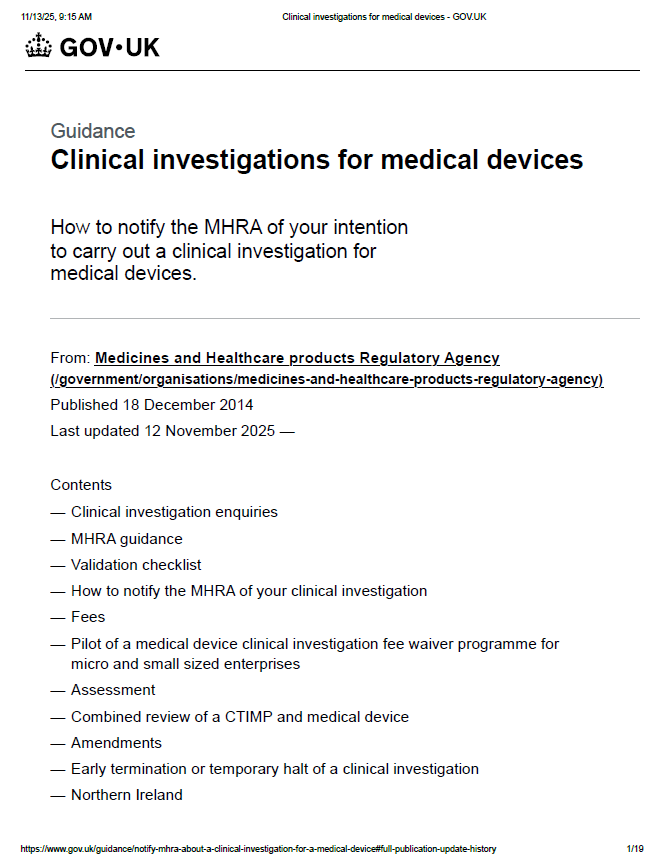MHRA Updates Guidance on Clinical Investigations – What Manufacturers Need to Know
The MHRA has published updated guidance on the requirements and processes for conducting clinical investigations for medical devices in the UK. The document (available for download below) provides comprehensive instructions for manufacturers preparing to carry out clinical investigations as part of the pathway to obtaining UKCA, CE or CE UKNI marking.
For manufacturers, these updates represent significant procedural and regulatory considerations, particularly regarding application timelines, validation criteria, safety reporting obligations, and the interaction with the MHRA throughout the investigation process.
Key implications for manufacturers
1. Stricter expectations for clinical investigation applications
Manufacturers must notify the MHRA at least 60 days before starting a clinical investigation in Great Britain. The updated guidance introduces clearer validation criteria and specifies the documentation required for a complete and acceptable submission.
2. Updated guidance documents and flow charts
In August 2025, the MHRA released new versions of the GB clinical investigation flow chart and its accompanying guidance. Manufacturers planning clinical studies must ensure they are working with the latest versions to avoid delays and non-compliance.
3. Increased clarity on safety and performance assessment
The guidance details how assessors evaluate device safety, pre-clinical evidence, clinical investigation design, and statistical considerations. Manufacturers must ensure the robustness of pre-market data and be prepared for potential MHRA requests for clarification during the 60-day review period.
4. Expanded guidance for investigations in Northern Ireland
Because Northern Ireland remains aligned with the EU MDR and IVDR, manufacturers conducting studies there must follow EU MDR requirements, even for multi-site UK studies. The MHRA confirms that updates to NI-specific flow charts and guidance are underway.
5. Detailed obligations for reporting deviations and serious adverse events (SAEs)
The updated guidance reinforces SAE requirements in line with MEDDEV 2.7/3 and MDCG reporting tables. Manufacturers must use the MORE portal for SAE reporting and provide quarterly summary reports, ensuring continuous regulatory oversight.
6. New fee waiver pilot for micro and small enterprises (2026)
A temporary pilot programme will offer up to ten clinical investigation fee waivers for innovative devices from micro and small UK enterprises. Although highly selective, this may create strategic opportunities for eligible manufacturers aiming to accelerate innovation.
Why this matters for manufacturers
These updates reflect the UK’s increasingly structured approach to clinical evidence generation for medical devices. For manufacturers, understanding and implementing the new requirements is essential to:
avoid delays to planned clinical studies,
ensure compliance with UK MDR 2002 and (where applicable) EU MDR 2017/745,
prepare high-quality submissions that meet MHRA expectations,
maintain smooth progression toward UKCA/CE/CE UKNI marking and market entry.
The full MHRA guidance can be downloaded below.
